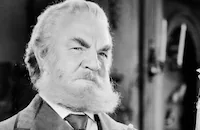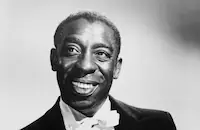Kid Millions
Brief Synopsis
Cast & Crew
Roy Del Ruth
Eddie Cantor
Ann Sothern
Ethel Merman
George Murphy
Burton Churchill
Film Details
Technical Specs

Synopsis
When Egyptologist Edward Grant Wilson dies, his seventy-seven million dollar fortune is supposed to go to his long-lost son Eddie, but others are eager to have it for themselves. Eddie, who has been living on a barge, is sent to Egypt on an ocean liner to claim his inheritance, leaving his sweetheart Nora, whom he lovingly calls "Toots." Also on board the ship, however, are his father's common law wife and her boyfriend Louis, who want to murder Eddie for the money, and Colonol Harry Larrabee, whose foundation claims the valuable treasure that Wilson found. Nothing goes right for Louis and Mrs. Wilson, Sr. who convinces the gullible Eddie that she is his "Mama," even though she is nineteen and he is twenty-five. Colonel Larrabee's claim is declared invalid when Gerald Lane, his neice Joan's fiancé, reveals that Wilson had never received financial support from the foundation. When they arrive in Egypt, Eddie saves the Princess Fanya from a barking dog, which she thinks is a bear, and she falls in love with him. She takes him home to her father, Sheik Mulhulla, who coincidentally is planning to kill whomever claims the treasure. Life in a harem proves too much for Eddie, who wants to remain loyal to Toots. He is further distressed when Joan, the colonel, Jerry, Mama and Louis are captured. Because they have grown fond of Eddie, they all deny that he is Wilson, Jr., hoping to save his life. When his identity is confirmed by the perplexed Eddie himself, though, the sheik decides to boil him in oil. Fanya saves him by telling Mulhulla that Eddie has committed Tramofatch, kissing her on a camel, and therefore must marry her. Eddie, however, thinks death would be better than marrying Fanya. He finds a way out when Ben Ali, who really loves Fanya, helps him escape in a plane. After a rough flight across the Atlantic, Eddie arrives in New York and finally realizes his dream of opening up a free ice cream factory for children. He is assisted by Mama, Louis and Toots.

Director

Roy Del Ruth
Cast

Eddie Cantor

Ann Sothern

Ethel Merman

George Murphy

Burton Churchill

Warren Hymer

Paul Harvey
Jesse Block
Eve Sully
Otto Hoffman
Stanley Fields

Edgar Kennedy
Jack Kennedy
John Kelly
Doris Davenport
The Nicholas Brothers

Henry Kolker

Lucille Ball
Tommy Bond
Leonard Kibrick
William Arnold
Fred Warren
Harrison Greene
Guy Usher
Matthew "stymie" Beard
Harry C. Bradley
Edward Peil Sr.
Harry Ernst
Eddie Arden
Ed Mortimer
Zack Williams
Everett Brown
George Regas
Noble Johnson
Lon Poff
Constantine Romanoff
Tor Johnson
Ivan Linow
Lalo Encinas
Bud Fine
Leo Willis
Larry Fisher
Sam Hayes
Malcolm Waite
Bob Reeves

Clarence Muse
Steve Clemento
Art Mix
Silver Harr
M. Rourie
Bob Kortman
Robert Ellis
Louise Carver
Theodore Lorch
Bobbie Lamanche

Bobby Jordan
J. Wacher
John Dowd
Charles Hall
John Collum
Wally Albright
Mickey Rentschler
Jacqueline Taylor
Carmencita Johnson
Patricia Ann Rambeau
Ada Mae Bender
Billy Seay
Tommy Bupp
Ann Bupp
The 1934 Goldwyn Girls
Crew
Harold Adamson
Ray Binger
Ralph Ceder
Richard Day
Walter Donaldson
Seymour Felix
Jacques Fray
Samuel Goldwyn
Stuart Heisler
Nunnally Johnson
Ray June
Gus Kahn
Omar Kiam
Burton Lane
Alfred Newman
Nat Perrin
William Pogany
Ray Rennahan
Arthur Sheekman
Ben Silvey
Vinton Vernon

Film Details
Technical Specs

Articles
Kid Millions on DVD
Often movies featuring early vaudeville stars and gags tend to be soft on plot and character, making for tedious going for modern audiences. But Kid Millions is a happy exception, not only with Cantor's farcical brand of comedy still hilarious on its face, but with a strong (albeit ridiculous) story holding things together. In fact, the movie gets funnier as it goes along. A famous archeologist has died and left behind a $77 million fortune, which a pair of lawyers has determined belongs to a penniless young man (Eddie Cantor) living on a Brooklyn barge. After some comic misunderstandings, Cantor is put on an ocean liner to Egypt to collect his dough. Meanwhile, a couple of shysters (Ethel Merman and Warren Hymer) hone in on the fortune themselves, convincing Cantor that they are his mother and "uncle Louie." A southern colonel and his daughter (Ann Sothern) are around, too, also claiming a piece of the pie, and George Murphy is on hand to romance Sothern.
The original screenplay, credited to Arthur Sheekman, Nat Perrin and Nunnally Johnson, is constructed into three distinct sections, with the first act set in New York, the second on the ocean liner, and the third in Alexandria, Egypt, where Cantor gets hilariously involved with a sheik's daughter (comedienne Eve Sully) and the sheik himself (Paul Harvey, excellent). Sheekman and Perrin had worked on several Marx Brothers movies at Paramount -- experience much in evidence here -- and Johnson was at the beginning of an already-illustrious career, having penned The House of Rothschild (1934) and Bulldog Drummond Strikes Back (1934). (Still to come were such greats as The Prisoner of Shark Island [1936], The Grapes of Wrath [1940] and The Woman in the Window [1944], to cite just a few.) Presumably Sheekman and Perrin supplied the comic gags, while Johnson held it all together with the underlying plotline.
Helping immensely is a wonderful score, with songs by Walter Donaldson and Gus Kahn, as well as Burton Lane and Harold Adamson. There's also one extravagant number written by Irving Berlin, "Mandy," in which Cantor (in blackface) shares the dance stage with the Nicholas Brothers in their first feature film. (They had previously appeared in short subjects.) The brothers are very young here -- little brother Harold looks especially tiny -- but their dancing, as usual, rivets the attention and blows everyone else away. All Cantor can do is watch, something that is treated as a gag. Ethel Merman gets the movie off to a rousing start with a peppy rendition of "An Earful of Music," and Sothern and Murphy later perform a lovely duet, "Your Head on My Shoulder." This being a Samuel Goldwyn musical, the famed Goldwyn Girls also make plenty of appearances, and among the gorgeous faces and legs one can find Lucille Ball and (supposedly) Paulette Goddard.
Director Roy Del Ruth is remembered for snappy 1930s comedies and melodramas like Taxi! (1932) and Employees' Entrance (1933), and Kid Millions is just as well-paced. Huge kudos are also in order to cinematographer Ray June, whose crisp black-and-white work cuts to vibrant three-strip Technicolor for the final seven minutes of the picture. In that sequence, Cantor has returned home with his fortune and opened a giant, fantastical ice cream factory to hordes of kids. It's a marvel of color, and an experiment in three-strip that worked well for Goldwyn. (It would be months before the first full-length three-strip Technicolor film was released: Becky Sharp [1935].) The ice cream fantasy sequence, with bizarre sets, women workers moving around on roller skates, and imaginative musical riffs, is an amazing achievement for 1934 and seems to have heavily influenced Willy Wonka and the Chocolate Factory (1971).
Several members of the Our Gang troupe appear in the early scenes on the Brooklyn barge and in the final ice cream sequence.
Warner Archive's disc of Kid Millions has fine picture and sound and is highly recommended.
By Jeremy Arnold

Kid Millions on DVD
TCM Remembers - Ann Sothern
TCM Remembers - Ann Sothern
Quotes
Trivia
Notes
According to news items in Daily Variety this film was in preparation for more than a year when it began production on July 16, 1934, and was partially filmed on location in Yuma, AR. The Technicolor "Ice Cream Fantasy," sequence which, according to news items was the last sequence of the picture filmed, was the first Goldwyn venture into color films. The song "Mandy" was originally written by Iirving Berlin for his 1918 Broadway musical play Yip Yip Yaphank. The song subsequently became one of Eddie Cantor's trademark numbers on stage and on the radio. The film marked the screen debuts of the vaudeville comedy team of Eve Sully and Jesse Block. Kid Millions marked the feature film debut of George Murphy. Modern sources note that Doris Davenport, who portrayed "Toots" in the film, also appeared in one production number as a "Goldwyn Girl" before being cast as the ingenue, and Paulette Goddard appeared as an extra in the film.














